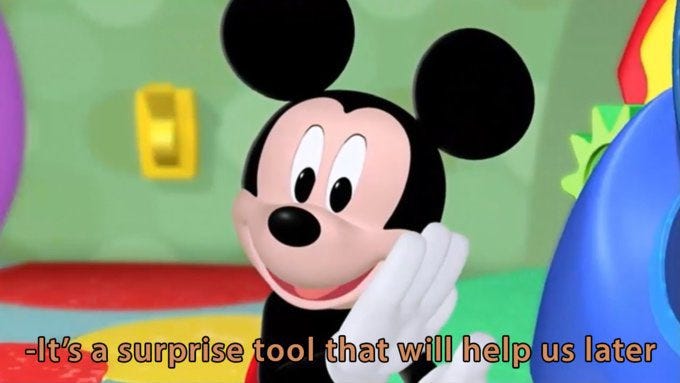Domesticating Weirdness [Trenchant Edges]
Welcome back poppets.
This is Trenchant Edges. The VERY RELIABLE newsletter about outbursts of fringe culture and their consequences.
We won’t have a pod to cast about this until next week, I need to get my producer a new laptop.
Last uh, time, we took a guided tour around the world of some of those consequences. The big picture is we're mid-transformation and flailing
It may be more wish than truth but we're headed towards a healed planet without the manic destruction of industrial extraction.
You know, should we overcome the many practical and logistical challenges of the next hundred years
I wanted to talk a bit about some of our tools to look at *waves hand* all this.
Through misadventure, I took an Introduction toLiterary Analysis course in college. I was a psych major at the time and going very hard into experimental theory and practice.
But this little literary theory course wrecked me.
It taught me the very useful concept of the interpretive lens. See, texts (as in any work you want to analyze) aren’t like the real world. They have a specific and usually limited scope: This poem or that book. We're gonna ignore the exceptions.
There’s no objective way to understand a text. You can draw on data: Who published it? How many copies sold (in theory, good data on sales always seem lacking for the public)? How long it is, how many editions? And other questions?
While sometimes interesting it doesn't tell you about the content of the text.
When all you have is a Hammer, everything looks like a Nail
The practical solution to this ambiguity isn’t to dismiss any kind of subjective reading as inherently useless fluff one doesn’t need to consider but to build a toolbox of different ways of looking at texts so you can build rigor into each way of seeing.
Dismissing awareness of interpretive lenses creates a kind of naive textual realism, the dangers of which can be easily shown by Evangelical Protestantism, which claims ownership of a “plain reading” of the bible that is, uh, pretty much arbitrary to their desires of what it means.
By not making your interpretation explicit, the process becomes invisible to you and you can no longer observe the way it distorts the text, the world, or yourself.
Denial makes you a prisoner of your own assumptions.
If you want clear thinking you’ve gotta find all your assumptions and get them out of your head.
Both your explicit assumptions and the hidden ones propping those up.
Because if you miss those, you can easily take shortcuts that completely undercut what you’re trying to do.
As part of researching my novel, I joined a book club about Michael Crichton’s Jurassic Park, which is basically about how assumptions break down under uncertainty and complex conditions.
I won’t gush too much about it, but it seems relevant here.
I’m not saying that missing your assumptions will get you mauled by dinosaurs, but technically you can’t rule it out entirely. It’s simply very unlikely.
Interpretative lenses help make those assumptions clear by both creating a framework for what kinds of questions you ask and what kinds of evidence you use to answer those questions.
For this newsletter, we’re interested in a kind of Weird Studies. My approach borrows a bit from phenomenology, a bit from the scientific method, and a bit from literature.
The problem with debunking as an approach is it’s kind of just hunting for things to nitpick. Once you find a thing you can arguably disprove, you move on. But that’s nothing that affects believers.
It’s why debunking never works: You’re only ever flipping over the surface evidence, not the deep structure of belief.
It feels productive and often can be a lot of work in itself, but it’s not really good at addressing the actual situation of a believer.
We want to go deeper than a surface skim. We want to put on our hip-waders and get really in there. What the fuck is going on?
And that means rejecting closure and easy ways to dismiss things.
The upside is you get to see the world from new angles.
How I Learned To Stop Worrying And Love The Existential Terror
In mathematics, there’s a really neat question: Why does so much mathematics seem to conform to reality? Like, why can physics apparently be expressed in mathematics?
And I’m going to ignore all that discussion to point out two things.
Because we made mathematics trying to do stuff in the world. and
A ton of mathematics doesn’t conform to reality.
So really it’s more sample/survivor bias than some ineffable quality of math.
But a lot of those #2s can be very interesting.

Control, one of my favorite games from the last few years, takes the themes of spooky urban legends/folktales being contained by the government (pioneered by Bill Cooper, The X-Files, and the SCP Foundation), and remixes it into a heroes journey about a chosen one with a suitably postmodern spin.
Only the chosen one can be the director/You Must Choose To Be Chosen
I bring up this constellation of ideas because they point to two poles on a spectrum between the cold facts of abstract mathematic formula-defined relationships and piles of metafiction on metafiction.
The World continues to get weirder as our old ideas become outdated and what used to be fiction is now reality.
We can’t stop this process, let alone reverse it.
And it’s getting faster.
Alvin Toffler wrote about Future Shock in 1970 and Douglas Rushkoff published Present Shock in 2013, but both seem outdated now. Partially because they describe worlds so distant from us to resemble cartoons, but mostly because time was never the important dimension we were traveling in.
It’s not just that changes in the world happen faster and their rate increases, but that our intuitions about linearity itself collapsing.
Most of our existence as humans was catching up to the speed of nature, and as far as we can tell, we only started moving faster with the invention of writing and all that farming/city-building bullshit.
Now we’re beyond the ability of our smartest thinkers to see more than a few years at best. 10, maybe 20 for relatively stable things.
During the Trump Presidency, people finally put a mainstream word on something happening for decades: Post-Truth.
I think this is a misnomer. I don’t think we’ve ever gotten to the Truth era. At best, what we had was an illusion of consensus mediated by broadcast television. Things were always messier in the real world, just as they’re generally nicer than the worst of social media would have you believe.
We’re still Pre-Truth.
So where does that leave us?
We want to talk about the weird because it’s gotten everywhere, like a fungus decomposing a building over time. It breaks out in moments and people have to spend months or years tracing it back to understand the mess of influences that got us there.
Are you fucking ready? Ready for me to tie this rambling mess to the original purpose of this newsletter?
Terence McKenna called it right decades ago: Because we can’t go back or stop, our only option is finding a kind of Forward Retreat that incorporates the good stuff from “civilization” with less or none of the bad stuff.
Was his solution of seeking salvation in the upper Paleolithic viable? I don’t know. Solutions are tricky that way.
I think our best shot is to look for radically different assumptions to build a society around.
Maybe not because they’re good or true, but because by understanding what doesn’t work we can narrow in on things that can.
If nothing else we can see the lineage of outbreaks of weird bullshit when they happen.
And since so much of that passes through literal fascists spreading ideas they hope will turn people towards fascism, this lineage of ideas stuff turns out to be pretty important.
As an example, Ancient Aliens is based on the book Chariots of the Gods by Erich Von Daniken, but he couldn’t find a publisher until Econ-Verlag (now part of the Bonnier Group) had it extensively rewritten by Wilhelm Utermann who was an editor at The Volkischer Beobachter (German “The People’s Observer”), the official newspaper of the nazi party during the war.
So, uh, some skepticism is well justified.
Wrapping Up
Alright, that’s another one in the can. It’s been a messy time over here, but we’re pulling things together.
With a little luck, the podcast version will in fact get going next week.
We’ve got a lot to talk about.
In May we’re going to finish setting up some core ideas and close some open loops from the past and then June will really dig into some new meat for our third anniversary on June 20th.
Oh, and that novel I’m writing? You can read the scraped first two chapters here, I’d love feedback.
I’ll also be releasing some Interviews for subscribers probably in June.
Believe it or else, I’ve been cooking a lot of little things I’m looking forward to sharing.
Alright, that’s enough for now.
See y’all next week.
Oh, I almost forgot. Heh. Some of you might have noticed a little switch in the byline.
Peace.




